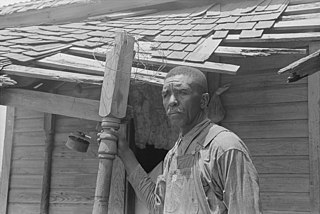Related Research Articles

Serfdom was the status of many peasants under feudalism, specifically relating to manorialism, and similar systems. It was a condition of debt bondage and indentured servitude with similarities to and differences from slavery, which developed during the Late Antiquity and Early Middle Ages in Europe and lasted in some countries until the mid-19th century.

Estoppel is a judicial device in common law legal systems whereby a court may prevent or "estop" a person from making assertions or from going back on his or her word; the person being sanctioned is "estopped". Estoppel may prevent someone from bringing a particular claim. Legal doctrines of estoppel are based in both common law and equity. It is also a concept in international law.

A tenant farmer is a person who resides on land owned by a landlord. Tenant farming is an agricultural production system in which landowners contribute their land and often a measure of operating capital and management, while tenant farmers contribute their labor along with at times varying amounts of capital and management. Depending on the contract, tenants can make payments to the owner either of a fixed portion of the product, in cash or in a combination. The rights the tenant has over the land, the form, and measures of payment vary across systems. In some systems, the tenant could be evicted at whim ; in others, the landowner and tenant sign a contract for a fixed number of years. In most developed countries today, at least some restrictions are placed on the rights of landlords to evict tenants under normal circumstances.

The Irish National Land League was an Irish political organisation of the late 19th century which sought to help poor tenant farmers. Its primary aim was to abolish landlordism in Ireland and enable tenant farmers to own the land they worked on. The period of the Land League's agitation is known as the Land War. Historian R. F. Foster argues that in the countryside the Land League "reinforced the politicization of rural Catholic nationalist Ireland, partly by defining that identity against urbanization, landlordism, Englishness and—implicitly—Protestantism." Foster adds that about a third of the activists were Catholic priests, and Archbishop Thomas Croke was one of its most influential champions.

Sharecropping is a legal arrangement with regard to agricultural land in which a landowner allows a tenant to use the land in return for a share of the crops produced on that land.
A leasehold estate is an ownership of a temporary right to hold land or property in which a lessee or a tenant holds rights of real property by some form of title from a lessor or landlord. Although a tenant does hold rights to real property, a leasehold estate is typically considered personal property.

In common law systems, land tenure, from the French verb "tenir" means "to hold", is the legal regime in which land owned by an individual is possessed by someone else who is said to "hold" the land, based on an agreement between both individuals. It determines who can use land, for how long and under what conditions. Tenure may be based both on official laws and policies, and on informal local customs. In other words, land tenure implies a system according to which land is held by an individual or the actual tiller of the land but this person does not have legal ownership. It determines the holder's rights and responsibilities in connection with their holding. The sovereign monarch, known in England as The Crown, held land in its own right. All land holders are either its tenants or sub-tenants. Tenure signifies a legal relationship between tenant and lord, arranging the duties and rights of tenant and lord in relationship to the land. Over history, many different forms of land tenure, i.e., ways of holding land, have been established.
In the American legal system, prior appropriation water rights is the doctrine that the first person to take a quantity of water from a water source for "beneficial use" has the right to continue to use that quantity of water for that purpose. Subsequent users can take the remaining water for their own use if they do not impinge on the rights of previous users.

Charles Cunningham Boycott was an English land agent whose ostracism by his local community in Ireland gave the English language the term boycott. He had served in the British Army 39th Foot, which brought him to Ireland. After retiring from the army, Boycott worked as a land agent for Lord Erne, a landowner in the Lough Mask area of County Mayo.
In the common law of England, the doctrine of worthier title was a legal doctrine that preferred taking title to real estate by descent over taking title by devise or by purchase. It essentially provides that a remainder cannot be created in the grantor's heirs, at least not by those words.

In the common law tradition, testamentary capacity is the legal term of art used to describe a person's legal and mental ability to make or alter a valid will. This concept has also been called sound mind and memory or disposing mind and memory.

Cotter, cottier, cottar, Kosatter or Kötter is the German or Scots term for a peasant farmer. Cotters occupied cottages and cultivated small land lots. The word cotter is often employed to translate the cotarius recorded in the Domesday Book, a social class whose exact status has been the subject of some discussion among historians, and is still a matter of doubt. According to Domesday, the cotarii were comparatively few, numbering fewer than seven thousand people. They were scattered unevenly throughout England, located principally in the counties of Southern England. They either cultivated a small plot of land or worked on the holdings of the villani. Like the villani, among whom they were frequently classed, their economic condition may be described as free in relation to everyone except their lord.
Self-help, in the sense of a legal doctrine, refers to individuals' implementation of their rights without resorting to legal writ or consultation of higher authority, as where a financial institution repossesses a car on which they hold both the title and a defaulted note. Individuals resort to self-help when they retrieve property found under the unauthorized control of another person, or simply abate nuisances. A self-help eviction refers to a commercial landlord's common law right to use self-help to reenter his or her property peaceably in order to evict a defaulting tenant or other person with no right of possession.

The Land War was a period of agrarian agitation in rural Ireland that began in 1879. It may refer specifically to the first and most intense period of agitation between 1879 and 1882, or include later outbreaks of agitation that periodically reignited until 1923, especially the 1886–1891 Plan of Campaign and the 1906–1909 Ranch War. The agitation was led by the Irish National Land League and its successors, the Irish National League and the United Irish League, and aimed to secure fair rent, free sale, and fixity of tenure for tenant farmers and ultimately peasant proprietorship of the land they worked.

Paraphernalia most commonly refers to a group of apparatus, equipment, or furnishing used for a particular activity. For example, an avid sports fan may cover their walls with football and/or cricket paraphernalia.

In law, abandonment is the relinquishment, giving up or renunciation of an interest, claim, privilege, possession, civil proceedings, appeal, or right, especially with the intent of never again resuming or reasserting it. Such intentional action may take the form of a discontinuance or a waiver. This broad meaning has a number of applications in different branches of law. In common law jurisdictions, both common law abandonment and statutory abandonment of property may be recognized.

Agriculture in the United Kingdom uses 71% of the country's land area, employs 1% of its workforce and contributes 0.5% of its gross value added. The UK currently produces about 60% of its domestic food consumption.
Operation Barga was a land reform movement, throughout rural West Bengal for recording the names of sharecroppers (bargadars) while avoiding the time-consuming method of recording through the settlement machinery. It bestowed on the bargadars, the legal protection against eviction by the landlords (jotedars), and entitled them to the due share of the produce. Operation Barga was launched in 1978 and concluded by the mid-1980s. Introduced in 1978, and given legal backing in 1979 and 1980, Operation Barga became a popular but controversial measure for land reforms. The ultimate aim of these land reforms was to facilitate the conversion of the state's bargadars into landowners, in line with the Directive Principles of State Policy of the Indian Constitution. To date, Op Barga has recorded the names of approximately 1.5 million bargadars. Since then, it has been marked as one of the most successful land reforms programs in India.

Landlord–tenant law is the field of law that deals with the rights and duties of landlords and tenants.

In English common law, real property, real estate, immovable property or, solely in the US and Canada, realty, is land which is the property of some person and all structures integrated with or affixed to the land, including crops, buildings, machinery, wells, dams, ponds, mines, canals, roads, and other things. The term is historic, arising from the now-discontinued form of action, which distinguished between real property disputes and personal property disputes. Personal property, or personalty, was, and continues to be, all property that is not real property.
References
- ↑ Dutton v. International Harvester Co., 504 N.E.2d 313 (Ind. Ct. App.., 1987)
- 1 2 One or more of the preceding sentences incorporates text from a publication now in the public domain : Renton, Alexander Wood (1911). "Emblements". In Chisholm, Hugh (ed.). Encyclopædia Britannica . Vol. 9 (11th ed.). Cambridge University Press. p. 308.
- ↑ Pittman v. Max H. Smith Farms, Inc., 506 N.E.2d 1139 (Ind. Ct. App., 1987).
- ↑ Renton 1911.